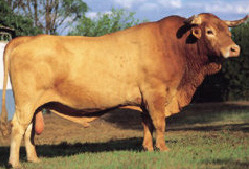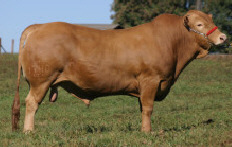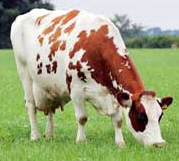



Caracu
History
The Caracu has been present in Brazil since the 17 th Century when the portuguese first imported european breeds. With over four centuries of selection the Caracu emerged as the breed most adapted to the tropical weather of Brazil. Photo courtesy of The Brazilian Caracu Association, www.abccaracu.com.br |
It is said that these original cattle entered Brazil via São Vicente-SP in 1534 and then were raised facing many difficulties - rough forage, diseases, harsh weather and parasites, these cattle were called Creoules. With cross breeding this breed separated into the Yellow-pelage (coat) and the Caracu.
Since 1980 a new breed selection phase was started with the use of modern selection techniques and genetic improvement, headed by the Caracu Breeders Brazilian Association (ABCC). In less than thirty years the Caracu has shown an accelerated evolution on its performance, but still keeping its original characteristics intact - adaptability, hardiness and maternal skills.
Characteristics
The Caracu has a short coat, the colour can range from light tan to beige with no white hair. It has small ears, horns and strong hooves. This breed is medium in size and muscular in conformation, the mature bulls can weigh 1000-1200 kgs and the cows 550-750 kgs.The females can get in calf around 14 to 15 months old and can keep on producing till 16 or 17 years, some have been know to calve at 21 yrs. A Caracu bull in a normal crossing season mates with about 50 females or so, presenting a high positive pregnancy indication.
The dairy yield is around 2100 kilos per lactation (including first-born heifers). They produce adipose milk, around 5%, and dry extract which is also elevated.
Other characteristics of this breed are calving ease, quiet disposition, managability, ability to digest rough forage, aclimatisation to hot climates and resistance to disease and parasites.
Statistics
 Photo courtesy of The Brazilian Caracu Association, www.abccaracu.com.br |
Comparative
Distribution
The Caracu is gaining popularity and mainly produced in South America.References (the above information was cited from the following sites)
www.abccaracu.com.br


